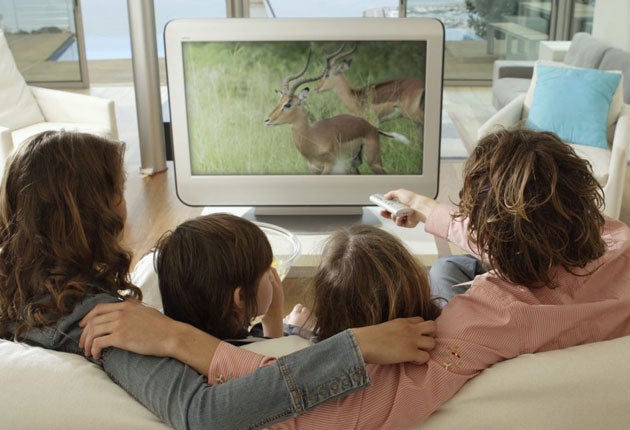Rhodri Marsden: Google could change the way we watch TV

Just like breathing, sleeping and dancing self-consciously at weddings, watching TV is something that comes pretty naturally. We've been doing it in the same way for decades; the manner in which families sat around watching the Eurovision Song Contest on Saturday was pretty similar to how an older generation watched the Queen's coronation in 1953, except the Queen obviously wasn't singing in heavily accented English about apricots, and the public didn't have the opportunity to vote out the Duke of Edinburgh.
We haven't demonstrated a great appetite for change, either. Sure, we've embraced the slow demise of the TV schedules in favour of catch-up or on-demand services. We even seem happy to buy into the dubious benefits of watching the news in HD. But despite being regularly told that the TV and the web will soon become seamlessly integrated, the vast majority of us have shown the same glorious ambivalence as we showed towards cars with gull-wing doors, or Battlefield Earth starring John Travolta.
Why? Firstly, there's the simple conflict between the way we watch television (slumped on a sofa with a bag of crisps balanced on our chest) and the way we've traditionally surfed the web (sat vaguely upright in close proximity to a keyboard). Secondly, fledgling web TV "solutions" – whether it's Samsung's Internet@TV, Apple TV, the Cello iViewer or a handful of others – haven't brought us "the web" per se, merely bits of content chosen by the device's manufacturer.
But the soaring popularity of online video has brought us careering to a point where a) television manufacturers are forced to take web TV more seriously, and b) our patience with the tedious procedure of hooking up our computers to the DVI port of our TV is wearing thin. Because when the web delivers a television-like experience – eg iPlayer, 4OD and aspects of YouTube – we want to slump on a sofa, not sit at a desk. And to our rescue last week rode Google, in partnership with Sony, who, as recently as last year, was saying that "consumers don't want" the internet on their television. Something's changed. Google TV will appear on new Sony sets in the autumn, or, if you resent having to buy another television – and who could blame you? – you can get a set-top box instead.
It will bring the whole web, along with regular TV channels, to a living-room screen running Android, Google's operating system; apps will thus be designed specifically for TV, rather than a computer. So YouTube will be TV-friendly for the first time; voice-activation apps will allow you to shout at the telly for an old episode of Columbo, rather than type in "Columbo"; and web browsers will be designed for viewing at a distance of 3m, rather than 3ft (check out the Kylo browser at kylo.tv for an excellent example).
There have been enough muted murmurings of approval to believe that, this time, it won't crash and burn. Which isn't to say it'll be a smooth transition; you'll hear the sentence "My telly has crashed" for the first time, while the stringency of safeguards to keep adult content out of the family living room will be a regular concern. People may even decide that they prefer using a laptop, tablet or phone while watching TV, rather than it being rolled up into one gadget. But Google may well end up doing for TV what Apple did for the mobile phone.
***
In our irregular "superstitious mumbo-jumbo believed by mobile-phone network" slot comes the news that Bulgarian operator Mobitel has suspended the number 0888 888 888, after the last three people allocated that number all died in suspicious circumstances. It's unclear why these unfortunate souls were susceptible to being poisoned, shot and shot respectively, but having Bulgaria's most memorable phone number probably didn't have much to do with it.
You might be forgiven for thinking that the choice of numbers we have in Britain is limited to the random selection offered to us in mobile stores, but if you're prepared to search online and pay through the nose, catchy numbers can be yours. £1,500 will secure you 07999 666 444, or, if you're on a stricter budget, 07522 222 266 can be yours for £575. Quite what the price tag for 07777 777777 is, or even if it's available, I was unable to find out. But the sheer volume of crank calls you'd get might make being shot outside a Sofia restaurant seem like welcome relief.
Join our commenting forum
Join thought-provoking conversations, follow other Independent readers and see their replies
Comments
Bookmark popover
Removed from bookmarks